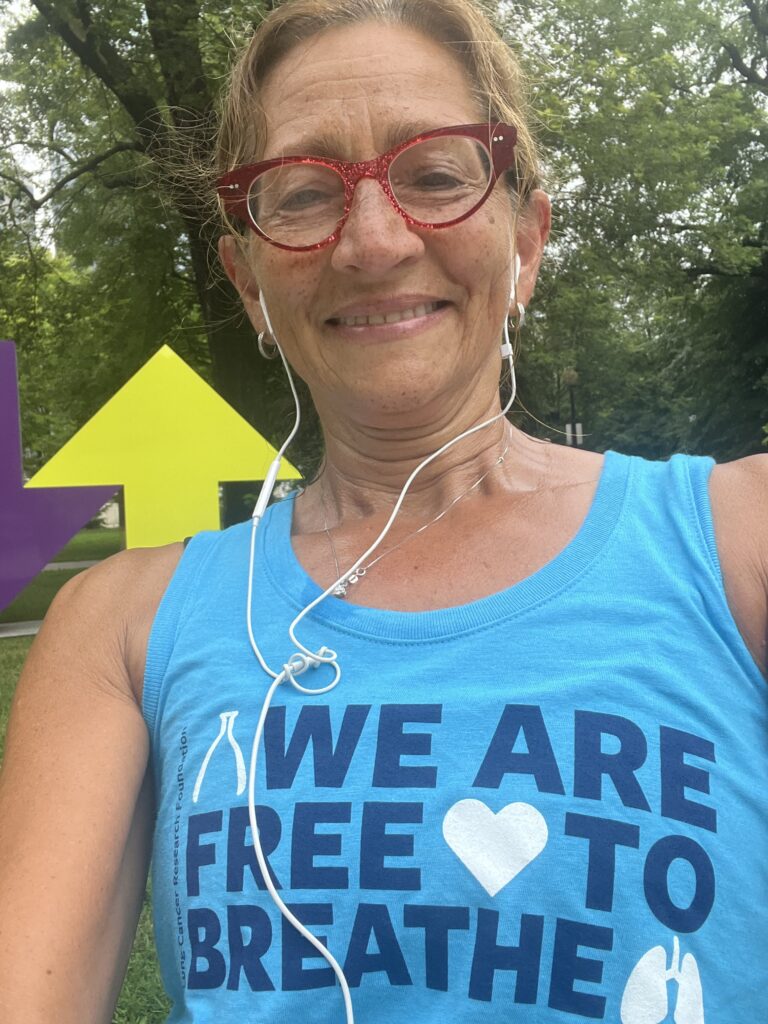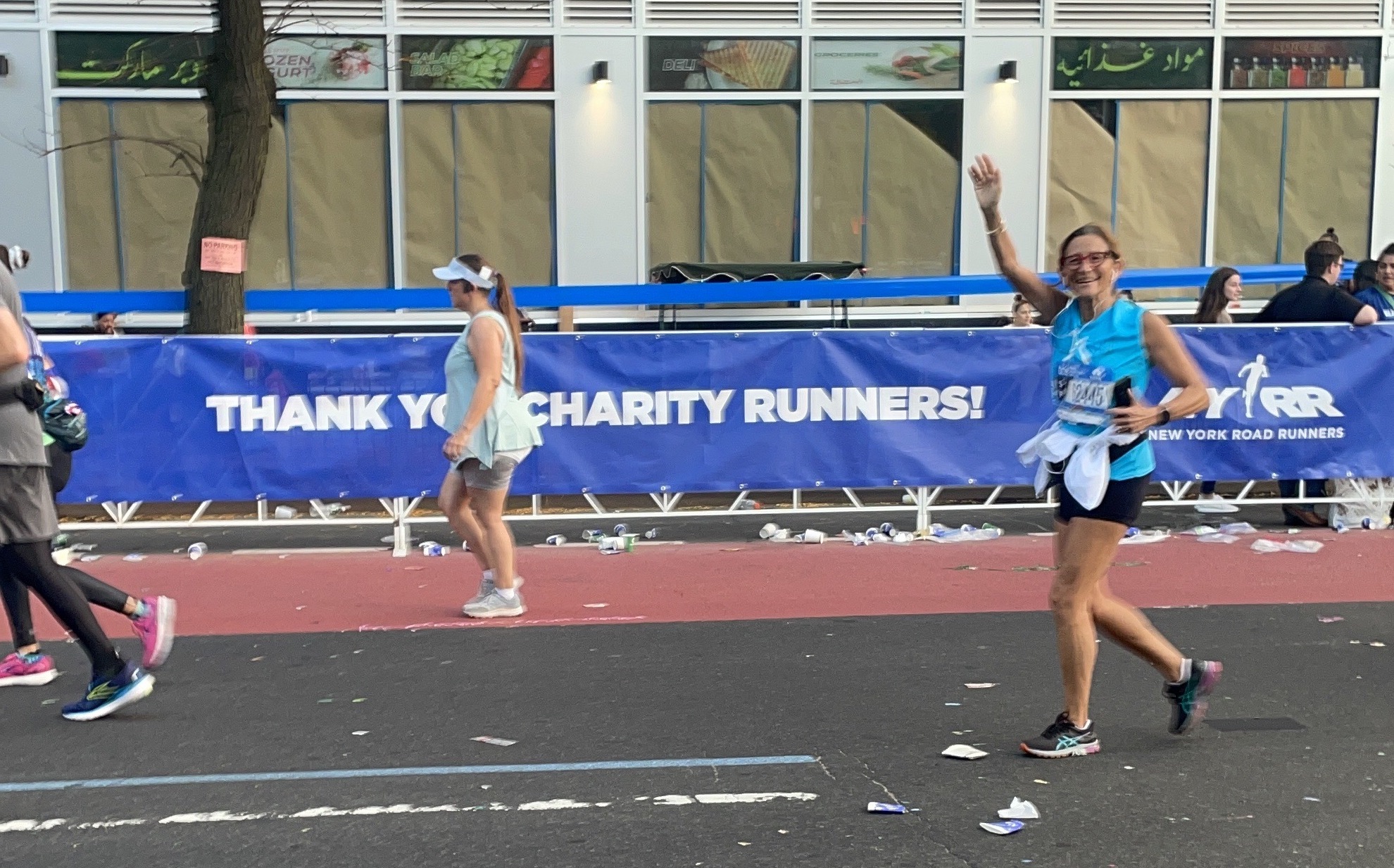Running a marathon a year after diagnosis

Jennifer Rosato Perea, who serves as Dean of DePaul University College of Law, ran a half marathon only four months after having a lobectomy. She knew she could do even more, so she committed to running the 2022 TCS New York City Marathon as part of Team LCRF.
“Being on Team LCRF is important to me to help support much-needed research to ensure more survivors like me have more treatment alternatives, and better quality of life. As a recent survivor of lung cancer, I want those diagnosed to see other survivors who are able to continue to run and remain active — which I did not see when I was diagnosed.”
Jenn was interviewed for the DePaul law school website before the November marathon. Watch below. Then read her story in her own words.
“I know that cutting-edge research enabled my medical team to give me the greatest chance to be cancer-free and maintain the best quality of life possible. I want research to help do the same for others.”
Q&A with Jenn on her lung cancer journey
How did you find out you had lung cancer?
I found out I had lung cancer through an MRI that was ordered before undergoing a hysterectomy in late 2020. I had no symptoms, so I did not get a follow up scan for months, as I did not believe I could have lung cancer. I was not a smoker, and lung cancer was not in my family history, so it was a shock and I was in denial for a while.
What treatment did you undergo?
I had a lobectomy in February 2022, removing my lower right lobe. Luckily, because I had Stage 1 cancer, I did not need to undergo additional therapy (so no radiation, chemo, or clinical trials, thanks to early screening). I have spent the last nine-plus months healing and strengthening my right lung.
Who has been your biggest support, and how did they help?
I have had the support of my family (especially my husband and daughter), and my work family at DePaul. My husband was so supportive when I decided to run the NYC Marathon to raise money for LCRF, even though it meant my taking long runs on the weekend when we usually spend time together. My daughter was a constant cheerleader and focused on my staying strong and true to myself. My work family supported me by not making a big deal of my having cancer and letting me be as “normal” as I could be – they did not stigmatize or patronize. Because there still remains stigma around cancer, it was important and appreciated for then not to focus on the diagnosis. My dad was a great coach through my marathon journey, as a former marathoner himself.
How did you maintain hope during treatment?
I maintained hope through my amazing medical team – they gave me hope by respecting my desire to keep a quality of life that included purposeful (and hard) work and being able to continue to run long distances. They provided me with candid responses, opinions based on research and data which they generously shared with authenticity and encouragement.
I also found hope through my mom, 92 years old, a two-time breast cancer survivor – through her experience I knew that having cancer does not mean a diminution of quality or length of life.
How did you learn about LCRF and its mission?
When I was diagnosed, I looked for people like me, who had undergone a lobectomy and still ran long distances – and there were few I could find. While looking for information about lung cancer, I found out through the internet that LCRF was supporting important research, and was also sponsoring a team for the NYC Marathon. I submitted an application to become a member of the team, not knowing that it was even possible since I thought the team was filled. I talked to Emma at LCRF, and she was so open and knowledgeable; I persuaded her to add me to the team, and it was the best “medicine” for my strong recovery! Being the only survivor on the LCRF mission always kept me humble and grateful, as other members of the team had suffered the loss of a family member.
Running the NYC Marathon with Team LCRF was my way of making some good out of the bad news of a shocking cancer diagnosis, and to be able to push my body (and lungs) to its limits. And it was a way to raise money for lung cancer research and reduce stigma about cancer – people are still surprised that I, as a lung cancer survivor, could run a marathon. I did not intend to be an inspiration to others, but glad that I have been able to motivate others to get screening or be more active. I also participated in a local fundraiser for LCRF.
What advice would you give someone just starting treatment?
I wish I knew that anyone can get lung cancer, and wish I had received follow-up screening and treatment earlier. I was very lucky that the cancer was slow-growing in Stage 1. Next time I may not be so lucky.
The advice I would give would be to advocate for yourself for screening and for treatment. Don’t ignore symptoms that seem off to you, and follow up on all your screenings. It is always better to know what is going on in your body, so that you can control your own treatment. Your treatment plan should reflect your own values.
